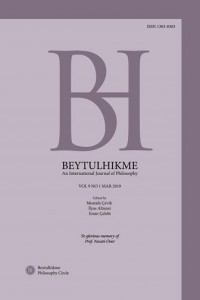Abstract
In Aristotelian political philosophy, the basic idea and form of “politics” is structured on a specific “ability” referring to speech. According to Aristotle, man is much more a political animal than the other beings in nature because he has the logos, which refers to “meaningful speech”. In this study, I will discuss the Aristotelian political philosophy including the logos and sources of meaningful speech by referring to some arguments that are discussed in his other biological and ethical works. In those works, Aristotle discusses the “ability to speak” in a framework of the structure of the “phone” which is distinguishably connected to political animality in the Politics. For Aristotle, man is more political than other beings because he has natural and intrinsic tendencies that will make him political. The aim of this study is to claim that the political philosophy of Aristotle should be discussed within the arguments of his biological, metaphysical and ethical assumptions.
Keywords
References
- Aristotle (1902). The Poetics. (Trans. S. H. Butcher). New York: Macmillan.
- Aristotle (1937). Parts of Animals, Movement of Animals, Progression of Animals. (Trans. A. L. Peck & E. S. Forster). New York: Harvard University Press.
- Aristotle (1938). On Interpretation. (Trans. H. P. Cooke). Cambridge: Harvard University Press.
- Aristotle (1991). Metaphysics. (Trans. J. H. McMahon). New York: Prometheus Books.
- Aristotle (1997). Politics. (Trans. P. L. P. Simpson). Chapel Hill: University of North Carolina Press.
- Aristotle (2002). De Anima. (Trans. D. W. Hamlyn). Oxford: Clarendon Press.
- Aristotle (2011). Nicomachean Ethics. (Trans. R. C. Bartlett & S. D. Collins). Chicago: University of Chicago Press.
- Cooper, J. M. (1982). Aristotle on Natural Teleology. Language and Logos. (Eds. M. Schofield and M. Nussbaum). Cambridge: Cambridge University Press, 197-222.
- Cooper, J. M. (1985) Hypothetical Necessity. Aristotle on Nature and Living Things. (Ed. A. Gotthelf). Bristol: Mathesis Publications, 150-167.
- Mayhew, R. (1999). King-Bees and Mother-Wasps: A Note on Ideology and Gender in Aristotle's Entomology. Phronesis, 44 (2), 127-134.
- Miller, F. D. (1995). Nature, Justice and Rights in Aristotle’s Politics. Oxford: Clarendon Press.
- Pellegrin, P. (2012). Aristotle’s Politics. The Oxford Handbook of Aristotle. (Ed. C. Shields). New York: Oxford University Press, 558-589.
- Sparshott, F. E. (1994). Taking Life Seriously: A Study of the Argument of the Nicomachean Ethics. Toronto: University of Toronto Press.
- Trott, A. M. (2010). Logos and the Political Nature of Anthropos in Aristotle’s Politics. Polis, 27 (2), 292-307.
- Von Fritz, K. & Kapp, E. (1977). The Development of Aristotle’s Political Philosophy and the Concept of Nature. Articles on Aristotle: Ethics and Politics. (Eds. J. Barnes & M. Schofield & R. Sorabji). New York: Duckworth, 113-134.
Abstract
References
- Aristotle (1902). The Poetics. (Trans. S. H. Butcher). New York: Macmillan.
- Aristotle (1937). Parts of Animals, Movement of Animals, Progression of Animals. (Trans. A. L. Peck & E. S. Forster). New York: Harvard University Press.
- Aristotle (1938). On Interpretation. (Trans. H. P. Cooke). Cambridge: Harvard University Press.
- Aristotle (1991). Metaphysics. (Trans. J. H. McMahon). New York: Prometheus Books.
- Aristotle (1997). Politics. (Trans. P. L. P. Simpson). Chapel Hill: University of North Carolina Press.
- Aristotle (2002). De Anima. (Trans. D. W. Hamlyn). Oxford: Clarendon Press.
- Aristotle (2011). Nicomachean Ethics. (Trans. R. C. Bartlett & S. D. Collins). Chicago: University of Chicago Press.
- Cooper, J. M. (1982). Aristotle on Natural Teleology. Language and Logos. (Eds. M. Schofield and M. Nussbaum). Cambridge: Cambridge University Press, 197-222.
- Cooper, J. M. (1985) Hypothetical Necessity. Aristotle on Nature and Living Things. (Ed. A. Gotthelf). Bristol: Mathesis Publications, 150-167.
- Mayhew, R. (1999). King-Bees and Mother-Wasps: A Note on Ideology and Gender in Aristotle's Entomology. Phronesis, 44 (2), 127-134.
- Miller, F. D. (1995). Nature, Justice and Rights in Aristotle’s Politics. Oxford: Clarendon Press.
- Pellegrin, P. (2012). Aristotle’s Politics. The Oxford Handbook of Aristotle. (Ed. C. Shields). New York: Oxford University Press, 558-589.
- Sparshott, F. E. (1994). Taking Life Seriously: A Study of the Argument of the Nicomachean Ethics. Toronto: University of Toronto Press.
- Trott, A. M. (2010). Logos and the Political Nature of Anthropos in Aristotle’s Politics. Polis, 27 (2), 292-307.
- Von Fritz, K. & Kapp, E. (1977). The Development of Aristotle’s Political Philosophy and the Concept of Nature. Articles on Aristotle: Ethics and Politics. (Eds. J. Barnes & M. Schofield & R. Sorabji). New York: Duckworth, 113-134.
Details
| Primary Language | English |
|---|---|
| Subjects | Philosophy |
| Journal Section | Articles |
| Authors | |
| Publication Date | March 28, 2019 |
| Published in Issue | Year 2019 Volume: 9 Issue: 1 |


